|
|
|
Sort Order |
|
|
|
Items / Page
|
|
|
|
|
|
|
| Srl | Item |
| 1 |
ID:
110112
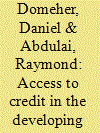

|
|
|
|
|
| Publication |
2012.
|
| Summary/Abstract |
Many households and businesses in developing countries are said to face credit constraints which limit their ability to undertake investments in various production-enhancing economic activities required to reduce poverty. This limited access to formal credit is often attributed to the lack of 'acceptable' collateral, resulting from the absence of formally registered land titles. Despite the fact that this assertion is fast gaining ground, land registration has not been found empirically to positively influence access to credit. This article seeks to critically examine the above argument and provide credible theoretical explanations as to why previous studies in the developing world have failed to establish any significant positive link between land registration and access to credit. It is argued that formalising property titles alone will not be enough solve the problem of limited access to credit in the developing world.
|
|
|
|
|
|
|
|
|
|
|
|
|
|
|
|
| 2 |
ID:
110108
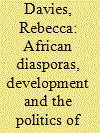

|
|
|
|
|
| Publication |
2012.
|
| Summary/Abstract |
This article seeks to add to the debate on the role of diasporas in development outcomes in sub-Saharan Africa by considering why diasporas are not apparently as effective as development agents in an African setting as they have proven thus far in other regions. It argues that changing diasporic engagement and activities on the continent should be examined against the backdrop of the emergence of a 'liberalisation from below' which emphasises local ownership of development outcomes, the historical variety of African state forms and the continuities in the exercise of power and the nature of these states. In so doing, it brings into focus the ongoing transformation in state-society relations whereby the dependence-of elites and ordinary citizens alike-on external resources continues to deepen, and the importance of this context in drawing any conclusions about the role of diasporas as agents of transformation.
|
|
|
|
|
|
|
|
|
|
|
|
|
|
|
|
| 3 |
ID:
110111
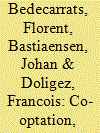

|
|
|
|
|
| Publication |
2012.
|
| Summary/Abstract |
The past decade has been marked by the resurgence of leftist political movements across Latin America. The rise of the 'new left' masks the ambivalent relationships these movements have with broader society, and their struggle to find an alternative to the prevailing development model. Filling the void left by failed public banks, the microfinance sector has grown significantly across the continent in an increasingly commercial form. Analysis of Nicaragua, Ecuador and Bolivia reveals that their new governments share a common distrust of microfinance. Yet, in the absence of viable alternatives for financial service provision, governments and microfinance stakeholders are forced to coexist. The environment in which they do so varies greatly, depending on local political and institutional factors. Some common trends can nevertheless be discerned. Paradoxically, the sector seems to be polarised into two competing approaches which reinforce the most commercially oriented institutions on the one hand, and the most subsidised on the other, gradually eliminating the economically viable microfinance institutions which have tried to strike a balance between social objectives and the market.
|
|
|
|
|
|
|
|
|
|
|
|
|
|
|
|
| 4 |
ID:
110104
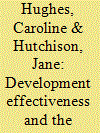

|
|
|
|
|
| Publication |
2012.
|
| Summary/Abstract |
International aid agencies have experienced a 'political turn' over the past decade, with political economy analyses becoming increasingly numerous as a means to drive development effectiveness. Yet aid agencies have so far failed to shift their aid modalities in response. The problem lies in an inadequate conceptualisation of 'politics'. Most donors continue to see development as a public good, rather than as the focus of contestation in a context of societal struggle, and consequently fail to take oppositional forces sufficiently seriously. This facilitates the misapplication of terms such as 'partnership' and 'ownership', contributing to failures in efforts to promote reform. A more truly political analysis of aid intervention entails two innovations: the use of structural analysis to distinguish between interests in reform; and the use of this distinction, in turn, to inform the practice of taking sides in political struggles. Case studies of international aid programmes in Cambodia and the Philippines illustrate how the failure of donors to take sides with particular reformers has resulted in lost opportunities to achieve concrete outcomes from development projects.
|
|
|
|
|
|
|
|
|
|
|
|
|
|
|
|
| 5 |
ID:
110107
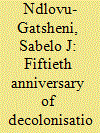

|
|
|
|
|
| Publication |
2012.
|
| Summary/Abstract |
This article deploys the concept of coloniality of power to critically reflect on the decolonisation process, using a 'colonial difference' perspective which enables a critical reflection on the limits of decolonisation from the side of the ex-colonised ordinary citizens of Africa. Three principal arguments are advanced. First, celebration of the decolonisation process as the proudest moment in African history obscures the continuing operation of the colonial matrices of power in maintaining Africa's subaltern position in global politics. Second, decolonisation resulted only in politico-juridical freedom, which is often conflated with freedom for the ordinary peoples of Africa. Third, celebrations of decolonisation are belied by the fact that ordinary African citizens engaged in new struggles for freedom soon after decolonisation aimed at liberating themselves from oppression by the inherited and imposed postcolonial African state. The article delves into the genealogical, ideological and ethical elements of decolonisation, alongside its political assumptions and implications. This facilitates the decoupling of ideas of liberation from notions of emancipation, which are often considered the same thing. It also enables critical engagement with the character of the postcolonial African state imposed on Africans without being fully reconstituted and decolonized institutionally. The article provides a fresh appreciation of ordinary citizens' ongoing struggles for liberation from the postcolonial state exemplified by the current North African popular uprisings against dictatorial regimes.
|
|
|
|
|
|
|
|
|
|
|
|
|
|
|
|
| 6 |
ID:
110113


|
|
|
|
|
| Publication |
2012.
|
| Summary/Abstract |
The Australian government as part of its aid programme allocates large funds to improve financial inclusion in developing countries. However, this does not take into account low educational levels in these countries. The existing literature on financial inclusion also treats the issue as mainly supply-centric and does not take cognisance of the fact that poor human development and high illiteracy levels in developing economies may prevent a large section of the population from benefitting from financial inclusion efforts, because of low awareness and comprehension of the financial services available. This study uses a detailed three-stage methodological approach to examine the relationship between financial development and human capital in 21 countries of developing Asia. The results show that a significant negative relationship exists between financial development proxied by M2/gdp and pupil:teacher ratios and a strong positive relationship exists between physical access to banks and expected years of schooling. Further, our financial development and educational development indices also show no clear pattern in the selected countries' financial and educational development.
|
|
|
|
|
|
|
|
|
|
|
|
|
|
|
|
| 7 |
ID:
110103
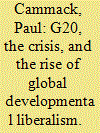

|
|
|
|
|
| Publication |
2012.
|
| Summary/Abstract |
The emergence of the G20 leaders' meeting during the recent global financial crisis as the 'premier forum for international economic cooperation' reflects a significant shift of hegemony over global governance towards the emerging economies but does not challenge the authority or objectives of the international financial institutions. On the contrary, successive G20 initiatives, culminating in the adoption of the Seoul Development Consensus for Shared Growth in November 2010, reveal both a further strengthening of the already close institutional relationship between the G20 and the Bretton Woods institutions and a strong shared commitment to a developmental form of global liberalism. This article charts the ascendancy of emerging economy perspectives through the lens of the G20, maps their ties to the imf and other international organisations, sets out the content of the new global developmental liberalism, and assesses the implications of emerging economy hegemony for the advanced and the emerging economies, respectively.
|
|
|
|
|
|
|
|
|
|
|
|
|
|
|
|
| 8 |
ID:
110105
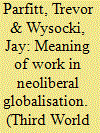

|
|
|
|
|
| Publication |
2012.
|
| Summary/Abstract |
This article argues that a central element of capitalist development, especially in its neo-liberal form, has been the configuration of a rationalised and individuated conception of work that helps to maximise capitalist efficiency. As the capitalist system has become globalised there has been an attempt to export this conception of work to the Global South by means of liberalisation programmes, many of them sponsored by the World Bank. These have entailed repression of organised labour in the attempt to force workers to adopt the role allocated to them by neo-liberalism, that of individual rational maximisers of utilities. It is argued that this attempt to globalise a neo-liberal conception of work must confront an Asia wherein local values (notably a preference for communitarian rather than individualistic values) and conditions have led both state and civil society to frame the concept of work as having collective rather than just individual significance.
|
|
|
|
|
|
|
|
|
|
|
|
|
|
|
|
| 9 |
ID:
110110
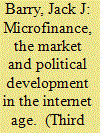

|
|
|
|
|
| Publication |
2012.
|
| Summary/Abstract |
This article steps outside traditional economic analysis of microfinance, and instead investigates the political ramifications of microfinance in developing countries. In particular, I argue that microfinance affects social capital, political empowerment and democratisation. I examine three emerging trends in microfinance: new technology; the rise of for-profit microfinance institutions; and the increase in individual, rather than group microfinance lending. In exploring these trends, I analyse seven prominent institutions: non-profits Kiva, Global Giving, Calvert Organization and MicroCredit Enterprises; and for-profits MicroPlace, MicroVest, and Oikocredit. My findings indicate that different types of microfinance institutions have unique characteristics that influence political development in a variety of ways, including but not limited to: democratisation, social capital, and economic and political empowerment. The article attempts to fill a gap in the literature and open up a conversation as to how differing approaches to microfinance lending influence political development.
|
|
|
|
|
|
|
|
|
|
|
|
|
|
|
|
| 10 |
ID:
110106
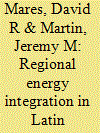

|
|
|
|
|
| Publication |
2012.
|
| Summary/Abstract |
In the 1990s regional economic integration regained popularity as a means for promoting sustainable economic development in the developing world. Latin America, where market liberalisation and pro-market presidents proliferated in that decade, emblemised this belief. Even today, when pro-state intervention governments are on the upswing, the rhetoric of economic integration continues. Yet integration schemes are faltering. This article presents a case study to demonstrate that neither markets nor political will of leaders can produce successful economic integration unless the politics of integration have been favourably resolved. Chile best exemplifies this situation. Chile's lessons learned through their natural gas and energy development model serve as an excellent prism for analysing the political economy of regional economic integration and speculating on what types of regional energy integration schemes can work best.
|
|
|
|
|
|
|
|
|
|
|
|
|
|
|
|
| 11 |
ID:
110109
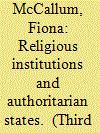

|
|
|
|
|
| Publication |
2012.
|
| Summary/Abstract |
The churches in the Middle East are generally perceived to be supportive of the authoritarian states in the region. The motivations for this strategy and its successes and limitations in the context of the authoritarian environment and the religious heritage of the region are explored. The article argues that the approaches pursued are determined by the structure of the community in relation to the majority and other Christian communities as well as by state policies towards the community. The overriding aim of church leaders of protecting their communities has led to a modern variation of the historical millet system, which provides them public status in exchange for their acquiescence in regime policies. This security guarantee, combined with wariness towards other potential political actors and the desire to protect their privileged position from communal challengers, has resulted in the hierarchies' preference for the authoritarian status quo rather than encouraging democracy promotion.
|
|
|
|
|
|
|
|
|
|
|
|
|
|
|
|
|
|
|
|
|